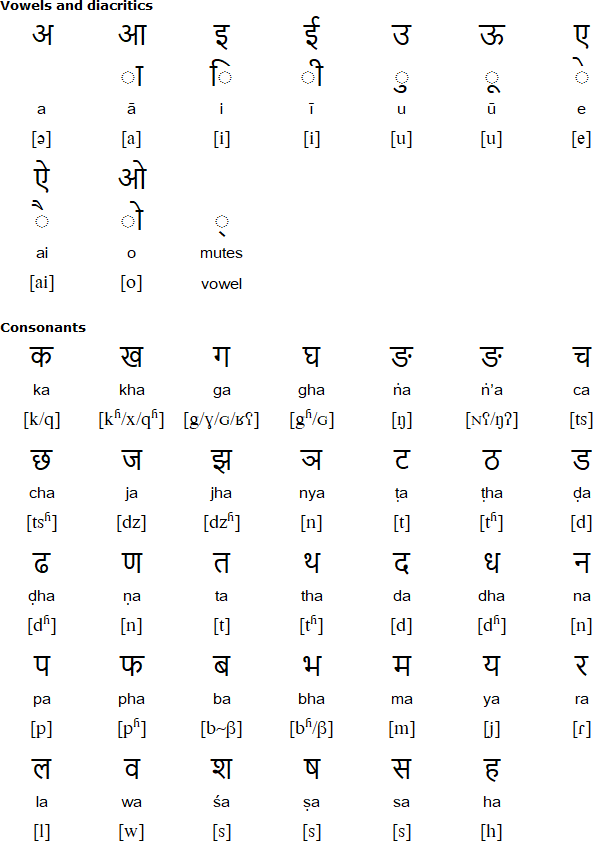Kusunda is a language isolate spoken in southern Rolpa District Lumbini province in west-central Nepal. In 2014 there were 87 speakers of Kusunda. By 2018 there was only one known speaker Rajamama Kusunda, who died on 19 April 2018 and it was thought that the language had become extinct. However, there are still a few speakers, who are working with Uday Raj Aaley, an author and researcher, to teach the language to children and adults.
There were some studies of the langauge in the 19th and 20th centuries. A grammar of Kusunda was published in 2005, and a dictionary in 2017. There are a few other publications on the languages as well.

Download an alphabet chart for Kusunda (Excel)
टिक सवट्टै नु प्रतिष्ठा कफेरा अधिकार ककेजे जिबेजी अगन्जी । गिना ग्याओ चिय कफेरा मागभया नाङ्टे अङी ।
ṭik sawaṭṭe nu pratiṣṭhā kapherā adhikār kakeje jibejī aganjī. ginā gyāo ciy kapherā māgbhayā nāṅ’ṭe aṅī.
All human beings are born free and equal in dignity and rights. They are endowed with reason and conscience and should act towards one another in a spirit of brotherhood.
(Article 1 of the Universal Declaration of Human Rights)
All human beings are born free and equal in dignity and rights. They are endowed with reason and conscience and should act towards one another in a spirit of brotherhood.
(Article 1 of the Universal Declaration of Human Rights)
Details provided by Biswajit Mandal
Information about the Kusunda language
https://en.wikipedia.org/wiki/Kusunda_language
https://www.ethnologue.com/language/kgg
https://escholarship.org/uc/item/83v8d1wv
https://theofdn.org/film/gyani-maiya/
https://www.pnas.org/content/101/15/5692
http://www.people.fas.harvard.edu/~witzel/kusunda.htm
https://linguae.weebly.com/kusunda.html
Adaizan, Ainu, Basque, Burushaski, Candoshi-Shapra, Chitimacha, Eskayan, Hadza, Haida, Karuk, Kawésqar, Keres, Kuot, Kusunda, Kutenai, Natchez, Nihali, Nivkh, Páez, Purepecha, Sandawe, Seri, Sumerian, Tartessian, Ticuna, Tiwi, Tonkawa, Tunica, Urarina, Waorani, Warao, Wardaman, Washo, Yaghan, Yele, Yuchi/Euchee, Zuni
Aka-Jeru, Angika, Athpare, Avestan, Awadhi, Bahing, Balti, Bantawa, Belhare, Bhili, Bhumij, Bilaspuri, Bodo, Bhojpuri, Braj, Car, Chamling, Chhantyal, Chhattisgarhi, Chambeali, Danwar, Dhatki, Dhimal, Dhundari, Digaro Mishmi, Dogri, Doteli, Gaddi, Garhwali, Gondi, Gurung, Halbi, Haryanvi, Hill Miri, Hindi, Ho, Jarawa, Jaunsari, Jirel, Jumli, Kagate, Kannauji, Kham, Kangri, Kashmiri, Khaling, Khandeshi, Kharia, Khortha, Korku, Konkani, Kullui, Kumaoni, Kurmali, Kurukh, Kusunda, Lambadi, Limbu, Lhomi, Lhowa, Magahi, Magar, Mahasu Pahari, Maithili, Maldivian, Malto, Mandeali, Marathi, Marwari, Mewari, Mundari, Nancowry. Newar, Nepali, Nimadi, Nishi, Onge, Pahari, Pali, Pangwali, Rajasthani, Rajbanshi, Rangpuri, Sadri, Sanskrit, Santali, Saraiki, Sirmauri, Sherpa, Shina, Sindhi, Sunwar, Sylheti, Tamang, Thakali, Thangmi, Wambule, Wancho, Yakkha, Yolmo
Page created: 03.10.21. Last modified: 03.10.21
[top]
You can support this site by Buying Me A Coffee, and if you like what you see on this page, you can use the buttons below to share it with people you know.

If you like this site and find it useful, you can support it by making a donation via PayPal or Patreon, or by contributing in other ways. Omniglot is how I make my living.
Note: all links on this site to Amazon.com, Amazon.co.uk
and Amazon.fr
are affiliate links. This means I earn a commission if you click on any of them and buy something. So by clicking on these links you can help to support this site.
[top]